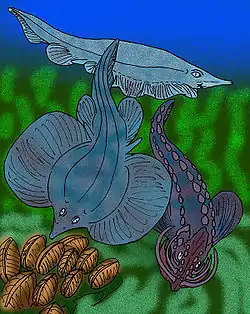Janassa
Janassa is an extinct genus of petalodont cartilaginous fish that lived in marine environments in what is now central United States of America and Europe during the Carboniferous and upper Permian.[1] It is known from teeth and a few poorly preserved body fossils from Germany (Kupferschiefer, Upper Permian) and England (Marl Slate, Upper Permian). According to the fossils, Janassa had a body plan very similar to that of the modern skate. Its teeth suggest it crushed and ate shellfish, such as brachiopods.
| Janassa Temporal range: Lower Carboniferous to Lopingian | |
|---|---|
 | |
| Janassa bituminosa & Menaspis armatus | |
| Scientific classification | |
| Kingdom: | Animalia |
| Phylum: | Chordata |
| Class: | Chondrichthyes |
| Order: | †Petalodontiformes |
| Family: | †Janassidae |
| Genus: | †Janassa |
| Species | |
| |
References
- Schaumberg, Günther (1977). "Die Richelsdorfer Kupferschiefer und seiner Fossilien, III". Aufschluss. 28: 297–352.
This article is issued from Wikipedia. The text is licensed under Creative Commons - Attribution - Sharealike. Additional terms may apply for the media files.